25 Points: Escape from Tomorrow
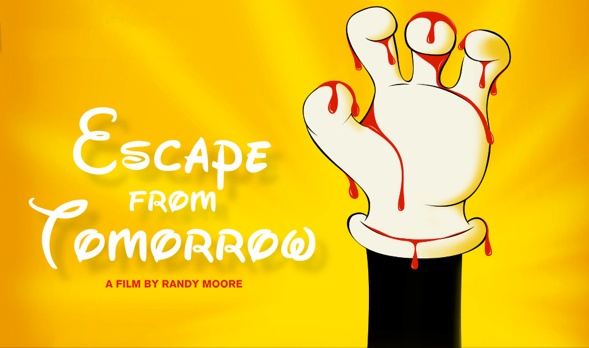
1. This movie stuck it to the man by filming the entire production in both Disneyland and Disney World without their permission.
2. Disney is apparently “aware” of this movie but has taken no legal action.
3. I’d never heard of this film until a friend forced me to watch it. I neither regret this nor thank him for it.
4. This film somehow succeeded in making Disney a terrifying menace that is a threat to fathers everywhere.
5. “What the fuck am I watching?” is what I thought multiple times while viewing this film.
6. Pedophilia is everywhere in Disney. Fathers chase after underage French girls, retired Disney princesses kidnap little kids to reenact scenes from Snow White, little boys are shown pictures of naked foreign women during cinematic rides—the list goes on and on.
7. Can’t help but be paranoid that Disney will sue me over this review. I have nothing, you bastards.
8. The film opened with someone being decapitated on a Disney ride—then cut to a scene of a corporate asshole firing the protagonist over the phone while he was on vacation with his family. The scary part is that both of these incidents have occurred multiple times throughout the course of modern human history. This makes me dread graduating college and entering the real world.
9. My friend and I both agreed that the protagonist’s wife was a bitch the entire film. (Spoilers: she sadly doesn’t die.)
10. There’s a scene where a nurse suddenly breaks into tears and I still don’t understand why.
June 19th, 2014 / 12:00 pm
25 Points: Standard Twin Fantasy
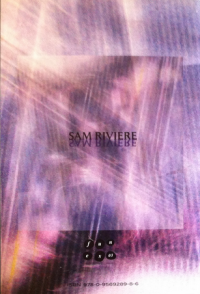 |
Standard Twin Fantasy
by Sam Riviere
F.U.N.E.X., 2014
36 pages / $7.60 buy from Amazon
|
1. Standard Twin Fantasy is a minimalist effort. Twinned in its very design – just fourteen short poems: 7 on the recto until you get to the staples where the whole thing doubles back on itself and delivers another 7 poems on the verso side for the remainder of the book.
2. This attention to detail makes sense for a writer who only started to write poetry whilst still an art-student and follows a swathe of books in the last few years which add such details to their poetry/alt-lit productions (trailers for books, books serialized initially as blogs, as tweets, books such as Riviere’s debut ’81 Austerities’ which include back-matter, more usually associated with non-fiction, that contains 81 reflections on the 81 poems that have come before it. Such things have been extended lately by the subject of my last 25 Points review of Richard Brammer’s ‘Public Dick Punk 83’ which goes as far as including a completely unusable index.
3. In some ways it is tempting to see Riviere as a product of Alt-Lit, and indeed he has admitted and advocated a pro-alt-lit position in his online essay ‘Unlike’: Forms of Refusal in Poetry on the Internet and has borrowed/helped to create many of the innovations of Alt-Lit, but still he seems, to me anyway, to be more of a shadowy figure in the mold of a Jon Leon or a Richard Brammer, rather than one of the many acolytes of Tao Lin, which although they are all different share a kind of Adderall-prose that doesn’t quite seem like these more outsider figures. This is pretty much a baseless thesis, more of a hunch really, but I stick by it.
4. Poem number 1 (all of the poems are untitled which I’m sort of glad about for some reason) instantly seems to evoke Jon Leon’s cast of (un)glamorous actresses, pornstars, flailing supermodels and minor TV stars with sentences such as ‘Sylvia taps a match on the rim of the big glass ashtray’, ‘Elizabeth slides a finger down the inside cover of a magazine’ and ending with the, in my own phrase ‘fucking sublime’ line: ‘Veronique angles the retro remote control and leans against the massive fridge’.
5. Point 3 will seem pretty silly to the typical English poetry reader who very much knows Riviere as a popular and rising god of English poetry, as his first book was published by the esteemed publisher Faber & Faber and he is almost certainly more successful than the aforementioned poets/alt-lit folk. Also, there is a chance that alt-lit will often seem pretty silly to the typical English (ideal?) poetry reader too, but that’s another story.
6. Point 5 sort of helps to confirm point 3 and I will now reinforce point 3 further by stating that some of this content first appeared in the very glossy AnOther magazine which means that this poet is very cool as well as being accepted (rightfully) as literary in the British poetry world. He pulls off the neat trick of being popular in lots of places at once and cannot easily be tethered into some kind of Faber house style as proven by this (possibly self-published?) pamphlet and the fact that this is only his second outing since his ’81 Austerities’ debut. He followed that up with a set of poems themed around/taking Kim Kardashian as a kind of totem (if memory serves) that could only be read by a reader requesting a password from the author.
7. ‘I am designed like depthless vinyl’ is a really good line from one of the poems.
8. These writings often hang together via a fairly simple parallelism.
9. There’s an odd blankness throughout that is coldly endearing. A similar feeling to walking around Hoxton, Shoreditch, and increasingly, Bethnal Green in London (for US readers think Williamsburg or something or wherever things have moved to now). This again means that Riviere is very cool and I don’t mean that pejoratively.
10. Music proper noun namechecks: ‘Exile on Mainstreet’, ‘Smashing Pumpkins’. Both in the same poem. Again this means he’s cool, again this isn’t meant as an insult. Bring back cool, I say.
June 12th, 2014 / 12:00 pm
25 Points: Fare Forward: Letters from David Markson
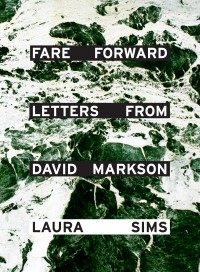 Fare Forward: Letters from David Markson
Fare Forward: Letters from David Markson
Ed. by Laura Sims
powerHouse Books, 2014
153 pages / $12.95 buy from powerHouse Books
1. The first of paragraph of the New York Times obituary of David Markson grants him the following description: “almost always surprisingly engaging and underappreciated.” Which strikes me as one of the most damningly reluctant compliments I’ve ever read one person give another.
2. almost always surprisingly engaging
3. David Markson, in a letter written two months before his death: “Everything I can think of would be making me repeat myself—and I almost prefer the silence. (Actually, I hate it.)”
4. It is endlessly frustrating to attempt to begin a review about a book about Markson. All sentences begin to feel like collections of adverbs and prepositions.
5. Yet adverbs tell us how a verb occurred. Prepositions place us in space. Nothing occurs in Markson’s later work. The only space in which his later novels take place is in the roving scope of the writer’s mind.
6. Nobody comes. Nobody calls. Reads a line from Reader’s Block.
7. Laura Sims’s collection of letters from Markson, called Fare Forward: Letters From David Markson. A series of postcards from a Greenwich Village address, from a writer almost nobody read, who had quit reading novels altogether.
8. Writing to Sims before a reading he was giving in 2007, who had told him she’d planned to bring friends, Markson asked: “But why in hell would you punish any good friend by making him/her go?”
9. I have the sense that this review is going badly, so I’ll here quote the late David Foster Wallace’s lackadaisically phrased claim re: Markson’s Wittgenstein’s Mistress—“a novel this abstract and erudite and avant-garde that could also be so moving makes ‘Wittgenstein’s Mistress’ pretty much the high point of experimental fiction in this country.”
10. Adverbs, too, are splattered all over his obit: “Mr. Markson’s books expressed, both mischievously and earnestly, the hem-and-haw self-consciousness of the perpetual thought-reviser. He wrote mostly monologues, or at least the narration seemed to emanate from a single voice, though the books were not necessarily narrated in the first person.”
June 10th, 2014 / 12:00 pm
25 Points: Godzilla

1. Spoiler Alert: Godzilla breaks shit and wins at everything.
2. Bryan Cranston is the best actor in this movie.
3. They fucking kill Bryan Cranston in the first third of the movie.
4. Confirmed societal standard: it’s still not okay to have New York City as the setting for a cataclysmic event that involves mass amounts of destruction—fictional monster battles included.
5. Aaron Taylor-Johnson’s character has a strange combination of good and bad luck due to the life-threatening situations he falls into and narrowly escapes at consecutive twenty-minute intervals.
6. Ken Watanabe is the second best actor in this movie.
7. Godzilla and I have similar lifestyles: go hard for about a week then sleep off the insanity for months or years on end. Repeat accordingly.
8. Godzilla actually looks like Godzilla in this movie. (Compared to the abomination made in 1999 that shan’t be named.)
9. This movie impressed me with its effective use of slow-pace plot format in actually waiting to show us our reptilian friend and all the loveable destruction he brings. (See Jaws for similar example.)
10. It’s actually pretty neat to have characters, besides Godzilla, that you actually give a shit about and have semi-decent back-stories. READ MORE >
June 5th, 2014 / 5:00 pm
25 Points: Public Dick Punk 83
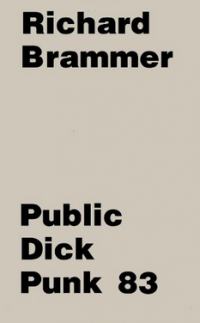 Public Dick Punk 83
Public Dick Punk 83
by Richard Brammer
East German Sunshine, 2014
93 pages / $5.98 (print version) $1.28 (e-book)
buy from Amazon
1. This is Richard Brammer’s second book following on the heels of last year’s MDMA and Menthol Cigarettes which first discovered and borrowed on Alt-Lit library. This one isn’t free but it’s still pretty inexpensive (especially the e-book but I’d recommend the print version).
2. This is to be the first in a long line of Public Dick Punk… books. The next is mooted to be named Public Dick Punk 82. We are not sure about the significance of the ‘83’ or the ‘82’. These poems/writings appear to be set in the present day.
3. Number 2 may be a lie as previously Richard Brammer stated that his second book was to be called ‘Selected Serotonin’ and fabricated (presumably fabricated?) an interview with retired English ballerina Darcey Bussell about the new book. He said the new book would be a homage to Teenage Fanclub album ‘Bandwagonesque’ but there book never appeared and was never mentioned again.
4. Public Dick Punk 83 is an extremely fast read, the reader flies through it and then wishes to fly through it again afterwards. In the words of poet Michael Hofmann it is ‘a machine for re-reading’.
5. It contains many proper nouns and names and brands and theseare collected in a particularly unhelpful index at the back. I will now list a few of these things: Michelle Williams, the Roland 303 drum machine, the NSA scandal, cupcake lesbian, Bjork, Bourne Supremacy, The Fall, Dreampop, Instagram, John Updike, Fractional Reserve Banking, Estonian Shoegaze, Google, TV, Hipster and PDF, Husker Du.
6. The index also elucidates on which pages basic conjunctions and articles such as ‘the’, ‘and’ and ‘if’ appear on. For instance: ‘if’ appears on pages 16, 29, 34, 37, 47, 55, 65, 70, 72, 84, 87, 92, and 96.
7. The poems/writings are split into five sections: ‘Log In, Remember me’, ‘Thrift with outside detractors’, ‘Food and Activities Outside’, ‘On Coloured Vinyl’ and ‘A short history of all memory’. None of these section titles appear to have much to do with the poems that they envelope but sometimes you think ‘Hey there’s a plan, here!’ so sometimes the reader thinks they do.
8. The book is very hipster friendly and is unapologetic for that, defiant even. It is dedicated to ‘the unreconstructed hipster’.
9. There is a poem about a girl named Edie whose name ‘isn’t Amy’ and who has ‘a cool cervix’.
10. The poems/writing themselves are generally written in a breathless kind of way with many idioms recognisable from social media but also from a variety of registers. You get the impression this writer hasn’t only grown up on the internet and references to early 80s style magazines such as ‘The Face’ and to a number of bands much beloved of what was, at one time, called ‘college radio’ (now known as bands that Pitchfork are likely to review) crop up throughout. As does late-80s, early 90s British rave culture. You never know, maybe he’s just Googled alot of this ‘vintage’ stuff.
May 29th, 2014 / 12:00 pm
25 Points: The Weaklings XL
 The Weaklings XL
The Weaklings XL
by Dennis Cooper
Sententia Books, 2013
84 pages / $12.95 buy from Sententia Books or Amazon
1. Dennis Cooper’s The Weaklings XL repeatedly interrogates three unknowables: the body, desire, and language.
2. Language is eternally indefinite: “You’re the / one who fired a gun at his head, so high / on whatever, and so depressed by my / lack of whatever that you were afraid you / might have otherwise not hit the target, / wherever I was at the time.”
3. We can never truly know our own bodies, the insides, the way they function. Because of this, one might assume the only way we can ever truly know the idea of a body is through exploration of the body of another. This is akin to Blanchot’s conception of death: we can never know our own death, we can only know the death of another.
4. Desire is impossible to ever know, to ever understand, to ever achieve in the sense of a totality. Cooper’s poems show how parts of desire can be hinted at in physical altercations, but desire is always immaterial and, thusly, can never be adequately incorporated into an experience.
5. In a suite titled “BOYS2BRELOCATED,” a selection of invented “personal ads” by under-age gay (or not gay, because it doesn’t really matter) men/boys soliciting sex, 666HEAVYMETAL666, 17 years old, posts the following: “DO YOU REALLY GIVE A CRAP? I’M SCARRED OK.” The suite presents a context in which misspelling echoes the reality of the quick-typing mode of the internet, where the reader can imagine these personal ads would be found. However, in a bizarre semantic twist, the context of the typo allows a double reading of the message: “SCARRED” can either be read as it is typed, as “scarred,” as in wounded, damaged or affected, or it could be taken as a misspelling of “scared,” as in frightened, terrified. This dynamic back-and-forth is all the context any of the personal ads need.
6. Before recent years Dennis Cooper was mostly known as a transgressive writer who was obsessed with writing about the sexual murders of young boys. This is his content. The success of his writing is dependent upon this obsession: it’s not literal (as in, I don’t think the claim could be made that Dennis Cooper the person is interested in murdering a young boy in a sexual context), but it’s the guiding force of the work. It’s a metonymic mode that allows a total and occasionally exhausting exploration of the indefinite nature of language, desire, and the body.
7. Somehow in recent years the content of Cooper’s work has been “white-washed” and the focus has turned onto his ability to construct sentences. Dennis Cooper is a brilliant prose stylist, and at the level of the sentence is work is amazing. This is demonstrated throughout all his work, I think; the poems here, all of the novels, his work in theater. However, I think ignoring the obsessive thematics of the work is doing the work a disservice. It strikes me as a sort of intellectualization that would position the work as some sort of purely intellectual art. Cooper is a brilliant writer who demonstrates remarkable intellect, but I think to read the sentences while ignoring the content would be a futile gesture. Language and the body, language and desire, these things are all linked.
8. Bernard Noël’s early career as a poet consisted of works that interrogated the relation of language to the body. This often resulted in the work carrying on into dark places. As a poet, I think Noël’s work is far stronger in its interrogation of the body/language divide, and much more accomplished. However, nobody reads Bernard Noël, especially not American audiences, as very little of the early poetry is available in English, and what is available is in no way easy to come by. In opposition, however, Cooper’s novels are far more accomplished than Noël’s single ‘straight-forward’ novel, The Castle of Communion.
9. Cooper’s poetry, while less formally/visually interesting or experimental than his novels, strips the words to the core of the problem that is often present in the novels: how can one mete language with desire, with the body.
10. In the annals of juvenile “trying to out-gross” one another, I remember hearing a “joke.”
“What’s the best thing about having sex with a twelve year old girl in the shower?”
“…”
“Slick her hair back and she looks like an eight year old boy.”
May 27th, 2014 / 12:00 pm
25 Points: Dear Lil Wayne
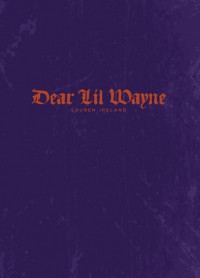 Dear Lil Wayne
Dear Lil Wayne
by Lauren Ireland
Magic Helicopter Press, 2014
62 pages / $11.00 buy from Magic Helicopter
1. Immediately I am reminded of Joe Wenderoth’s Letters to Wendy’s. The cover to his book and Dear Lil Wayne even kind of look the same.
2.
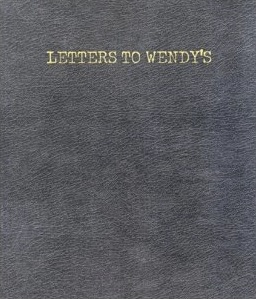
3. The dedication of the book goes to Lil Wayne, but below that another dedication/statement reads: “hip hop, you saved my life.” I think this is particularly poignant. Sometimes when bands are interviewed they’ll say something like, “We get letters from fans telling us that this song/album helped them through a hard time.” The project of this book is proof of the kind of power music can have and I totally relate and understand, as I’m sure many other readers probably can, too.
4. The book has a type of preface in which Ireland gives us some information about Lil Wayne, primarily concerning his incarceration. This preface ends: “I sent these letters to Lil Wayne during and after his incarceration. He never wrote back.” There’s an almost even split of letters written while Lil Wayne was in jail and after he was released.
5. I wouldn’t go so far as to say Dear Lil Wayne is a form of hero worship, but rather an incarnation of the advice, “write about your obsessions.”
6. And in this writing through obsession, Ireland weaves together the comic and tragic for very memorable poems.
7. For example, “September 17 2010”:
Dear Lil Wayne,
Jason and Furst say they get fear boners. Do you? Probably not. Jason says there’s like a Nicaraguan death squad after his dick. Does this mean boys are just as scared as girls? All this time I was sure it was a joke when a boy liked me. In these cases, I don’t get fear boners. I just feel kind of bad.
8. From the first sentence this poem is engaging. The following “Do you?” and “Does this mean boys are just as scared as girls?” maintains a move that appears throughout the book: Ireland is almost always asking Lil Wayne questions in her letters.
9. “September 21 2010” begins, “Do people think you are funny when you are actually really sad?”
10. “November 5 2010” (the day after Lil Wayne’s release) begins, “Do you feel different yet?”
May 22nd, 2014 / 12:00 pm
25 Points: 7 Days and Nights in the Desert
 7 Days and Nights in the Desert (Tracing the Origin)
7 Days and Nights in the Desert (Tracing the Origin)
by Sabrina Dalla Valle
Kelsey Street Press, 2013
88 pages / $13.00 buy from Kelsey Street Press
1. Sabrina Dalla Valle is an alchemist, a sorceress, scribe.
2. The role of poet as spell-caster/magician/mystic is seen through these pages. If it’s not clear, how can I say this?
3. everything is indication of moisture in a landscape– not just density of species, but also the shape of the earth.
4. How to propagate a landscape?
5. While reading Dalla Valle’s book I recall being ten years old, casting my first spell.
6. Poetry should transmutate; cause a change from one form, nature, substance, or state into another. In other words to transform the temporal existence.
7. as if not yet fully human
8. Meditation requires practice. There’s an alchemy at work here in these lines
9. Reflect upon the nuances of the question of: what gives us life?
10. like filaments
11. writing is read by the dream
12. I ordered feverfew and other herbs from a catalogue and had it shipped via Cash on Delivery (C.O. D.), a service that no longer exists
13. At the skin of your breath is poetry
14. Photons are their mirror
photons can change into each other:
presence into image, image into presence.
but they can form into mirror planets
and even mirror stars
15. My mother wrote the mailman a check
16. Poems are the path of veins. There’s a ________________ at work here
17. Like poems representing metals
18. Meditation requires practice
19. the principle of combustibility contained within the artist’s line

20. has been swelling in my stomach
21. the charge between two words passed back and forth between lovers
22. can touch you
23. can touch
24. embroidered sky
25. If I reach out far enough I can touch that ten-year-old self through the fickle of curved stars
Mg Roberts’ bio:
Born in Subic Bay, Philippines, Mg Roberts teaches writing in the San Francisco Bay area. She is the author of not so, sea (Durga Press, 2014), a Kundiman Fellow, and Kelsey Street Press member. Her work has appeared in the Stanford Journal of Asian American Studies, Bombay Gin, Web Conjunctions, and elsewhere. She’s currently working on an anthology of critical essays on avant-garde writing for/by writers of color.
May 20th, 2014 / 12:00 pm
25 Points: Atalanta (Acts of God)
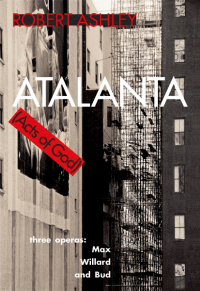 Atalanta (Acts of God)
Atalanta (Acts of God)
by Robert Ashley
Burning Books, 2011
208 pages / $25.00 buy from Amazon or SPD
24. When I began this review Robert Ashley was alive. In light of his death, I feel a compulsion to redraft and make these twenty-five points address something more. I want to talk about seeing Foreign Experiences and Lectures to Be Sung performed, about composition and improvisation, contemporary opera, and the intersection of music and language. Ashley’s work is full of good discussions. I’m attracted to the just-some-dude delivery style and storytelling aspects in the operas. One of my composer pals can’t follow the stories at all, and seems obsessed with the involuntary speech in Ashley’s work. Ashley’s work is so dense, and there are so many lessons that I take away from his work as a performer and writer. It’s hard to limit the discussion, especially given this kind of retrospective appreciation and the span of his work.
April 22nd, 2014 / 12:00 pm
25 Points: Is It My Body?
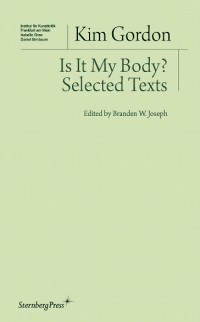 Is It My Body?
Is It My Body?
by Kim Gordon
Sternberg Press, 2014
182 pages / $18.86 buy from Amazon
1. Kim Gordon the New York City artist is one and the same with Kim Gordon, bassist of Sonic Youth.
2. Despite her claim, “I don’t think of myself as a musician,” whether they’re “on hiatus” or not, the band’s music remains the central association by which readers are likely to recognize her name.
3. I’m no diehard fan of Sonic Youth. Although I do, after a fashion, dig their music and several years ago saw them play The Crystal Ballroom in Portland, OR.
4. This is no tell-all. Sonic Youth is more an afterthought than anything here, a near excuse to remain creative—though no less central to Gordon’s life.
5. Gordon’s reasoning for taking part in Sonic Youth: “Being part of a music culture or subculture appealed to me more than staying outside and commenting on it in a work of art.”
6. This book zooms. It’s a sonically charged brain charge; a light breeze to read yet nevertheless heavily informative. Contents range from Gordon’s first published texts from the early 1980s rather seamlessly on up to a conversation she had with sometime-fellow collaborator Jutta Koether, not even a year ago.
7. Gordon skirts the edges of official art gallery/curator talk, usefully dipping into its discourses only to flaunt her independence from reliance upon them to express her thoughts. While postmodern, avant-garde, theory-driven vocabularies and accompanying ideas are occasionally floated and tussled with, they’re smoothly exited from without distracting from the natural style of her writing.
8. Gordon tells of only useful and/or interesting things, both historical and eternal.
9. “One of the appeals of seeing No Wave bands in New York early on was that it was such a strangely abstract music. It was very free and very abstract. If you didn’t have any means to enter the galleries as an artist, being in a band was a way to be expressive and be independent of the gallery system.”
10. Unedited: “How many grannies wanted to rub their faces in Elvis’s crotch and how many boys wanted to be buttfucked by Steve Albini’s guitar?”
March 27th, 2014 / 12:00 pm
